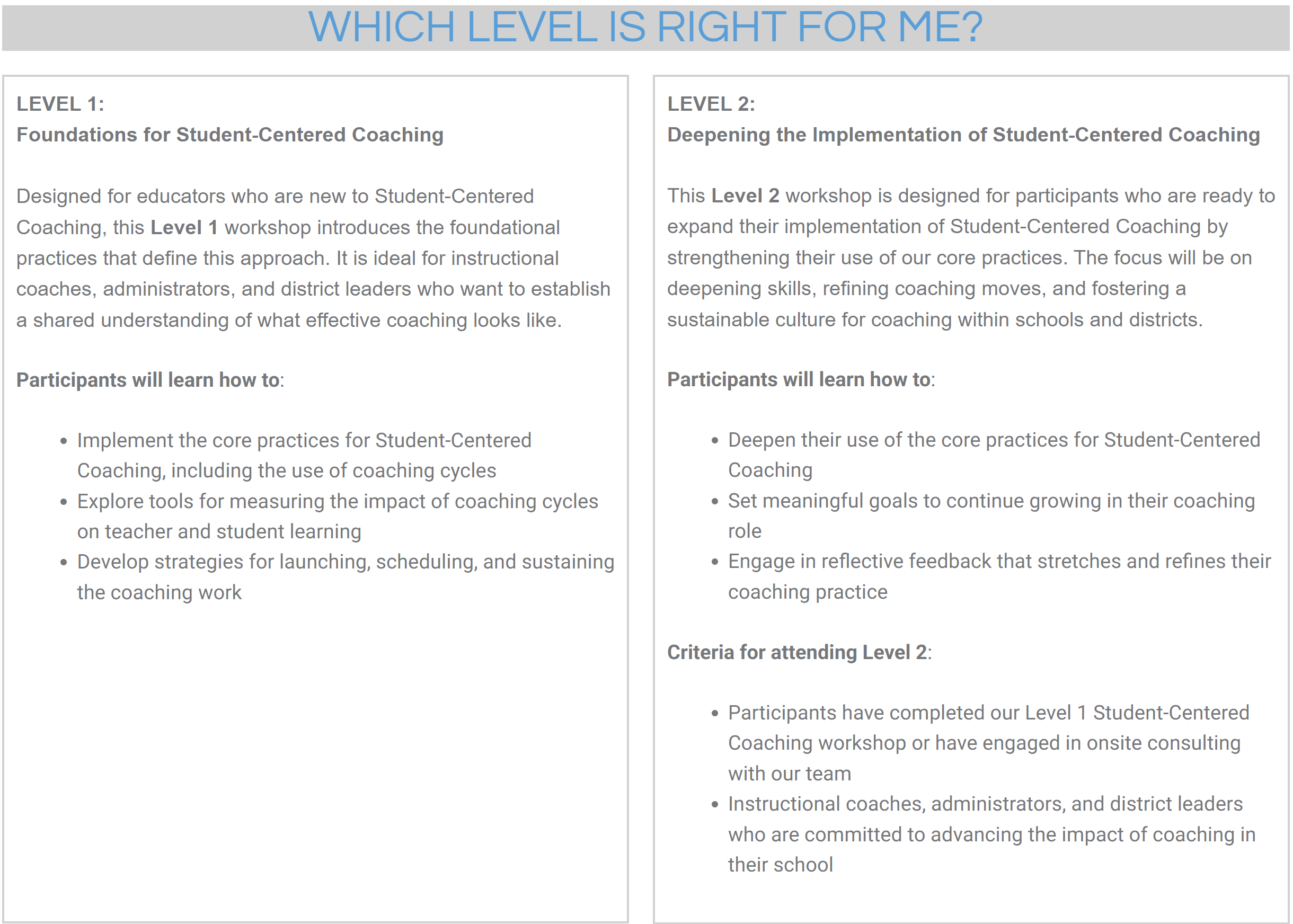Starting coaching cycles effectively is a crucial aspect of instructional coaching and can sometimes be daunting. When teachers organically want to partner with a coach to grow in an area or simply understand better how to reach their students, amazing things will happen. The role of instructional coaches should be centered around actively seeking opportunities to support individual teachers or grade level Professional Learning Communities (PLCs) in their mission to help students achieve new levels of success.
“Any curriculum change requires substantial support to ensure a smooth transition and successful implementation.”
If you’re an instructional coach looking for ways to kickstart coaching cycles, here is one way to reach out to teachers – new curriculum Introducing a new curriculum or teaching strategy is a significant event in any school. When this happens, it is naturally a time when teachers need a lot of support. Any curriculum change requires substantial support to ensure a smooth transition and successful implementation. The instructional coach does not have to be the “expert,” but more of a collaborator. Here’s how instructional coaches can play a vital role during these periods of change:
- Alignment: Helping align the new curriculum to state standards and the learning objectives are also aligned to where your district or schools goals are. Teachers may need assistance or help in creating new lesson plans because of the new curriculum.
- Pedagogical Shifts: Changes in teaching strategies may require teachers to shift from traditional lecture-based methods to more student-centered or inquiry-based approaches. This shift can be daunting for educators who are accustomed to a particular style of teaching. Recently, the school I am a part of adopted a new math curriculum that has a different approach to lesson delivery than the curriculum we had before. Teachers had to think about their approach and timing of each lesson differently.
- Resource Adaptation: Teachers may need assistance in adapting or creating new resources and lesson plans that align with the new curriculum. This includes developing assessments, activities, and materials.
- Assessment and Evaluation: Implementing a new curriculum often involves changes in assessment and evaluation practices. Teachers need support in designing effective assessments and interpreting assessment data.
How Instructional Coaches Can Provide Support:
- Professional Development: Offer targeted professional development sessions that focus on the new curriculum or teaching strategies. These sessions should be designed to address teachers’ specific needs and questions. The worst would be to plan professional development that addresses things teachers do not need or are not meeting teachers where they are at.

Photo compliments of Getty Images on Unsplash+ - Modeling: Coaches can model effective instructional practices related to the new curriculum, demonstrating how to teach using the new materials or strategies effectively.
- Observation and Feedback: Conduct classroom observations to provide feedback to teachers on their implementation of the new curriculum.
- Resource Sharing: Help teachers curate and share resources, such as lesson plans, how to use textbooks, online tools, and teaching aids, that align with the new curriculum. This can save teachers valuable time and effort. Ensure grade level PLC’s are sharing resources and they are sharing how lessons are going.
- Co-Planning: Collaborate with teachers to plan lessons and units from the new curriculum. This co-planning process helps teachers gain a deeper understanding of how to use the materials effectively.
- Data Analysis: Assist teachers in analyzing student performance data related to the new curriculum. This data-driven approach can help identify areas where students may need additional support. This data can be used to support coaching cycles and help identify weaknesses and strengths.
- Peer Collaboration: Encourage teachers to collaborate with their colleagues who are also implementing the new curriculum. Sharing experiences and best practices can be highly beneficial. Volunteer to watch teachers’ classrooms as they visit other classrooms that have successfully implemented the new curriculum/strategy.
- Regular Check-Ins: Schedule regular check-in meetings with teachers to discuss their progress and any challenges they are facing. Provide ongoing support and encouragement.
- Problem-Solving: Help teachers troubleshoot challenges and find solutions. This may involve brainstorming alternative approaches or providing additional resources.
- Flexibility: Recognize that not all teachers will adapt to the new curriculum or teaching strategies at the same pace. Be patient and adaptable in your approach, tailoring support to individual needs.
- Celebrate Success: Acknowledge and celebrate teachers’ successes and achievements in implementing the new curriculum. Positive reinforcement can boost motivation and morale.
- Advocate: Advocate for teachers within the school to ensure they have the necessary resources, time, and support to implement the new curriculum.
“Coaches’ guidance and ongoing support can make a significant difference in ensuring the changes lead to improved student learning outcomes.”
When changing curriculum or teaching strategies, instructional coaches play a vital role in helping teachers transition. Coaches’ guidance and ongoing support can make a significant difference in ensuring the changes lead to improved student learning outcomes.
Resources
Please login or register to claim PGPs.
Alternatively, you may use the PGP Request Form if you prefer to not register an account.




